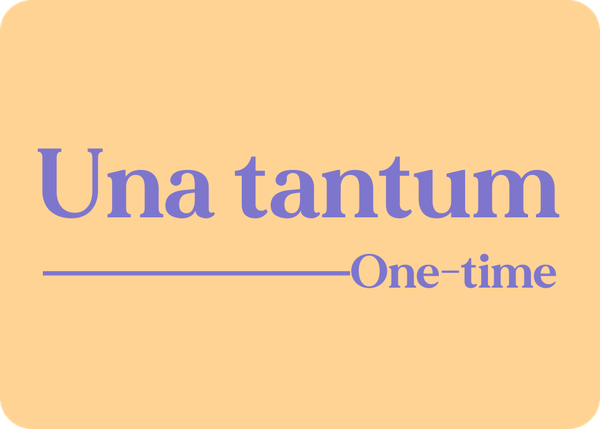Una tantum
PSEUDO-LATIN EXPRESSION
Meaning and English translation 🔖
One-time, One-off
🇬🇧 Refers to an event that occurs only once.
🇮🇹 Indica un evento che avviene una sola volta.
Example sentences 💬
Il governo ha previsto un bonus una tantum per i lavoratori dipendenti.
The government has provided a one-off bonus for employees.
Questo è un pagamento una tantum, non un abbonamento.
This is a one-time payment, not a subscription.
This article is brought to you by Giulia School, where you can learn Italian the natural way—with real conversations and passionate teachers guiding you every step of the journey. It’s the closest thing to immersion you can get without living in Italy. Click here to learn more.
Idioms with zucca 🇮🇹
Pagamento una tantum
→ One-time payment
Bonus una tantum
→ One-time bonus
Premio una tantum
→ One-time bonus
Donazione una tantum
→ One-time donation
Rimborso una tantum
→ One-time refund
Commissione una tantum
→ One-time fee
Tassa una tantum
→ One-time tax
Where does the expression come from? 🔎
Una tantum was not used by the ancient Romans or in classical Latin texts.
In reality, it is a formula created more recently in the context of modern or pseudo-Latin.
The phrase is composed of "una," meaning "once," and "tantum," meaning "only."
The formula has a long history of use in official, bureaucratic, and ecclesiastical contexts.

For example, in 1875, Marco Minghetti - an important Italian politician of the time, also known for being the Minister of Finance and a tutor to Margherita of Savoy - used "una tantum vice" in his speech on the state budget, where "vice" meant "time." References to "una vice tantum" can also be found in the documents of the First Vatican Council (1868-1870) and even earlier texts, indicating a single action or payment.
Over time, the phrase evolved, losing elements like "pro" and "vice" and becoming the simplified "una tantum" that we know today.
Did you know that... 🤓
Impress your italian friends with curious facts about Italy and its culture
An interesting curiosity is that in Italy, many people confuse the expression "una tantum" with "una volta ogni tanto" [from time to time]. However, these two expressions have very different meanings.
"Una tantum" means something that happens only once, without repetition. For example, a one-time payment is a payment made only once. On the other hand, "una volta ogni tanto" means something that happens occasionally, without a regular frequency.
This confusion can lead to misunderstandings, especially in financial or administrative contexts. Using "una tantum" correctly is important to avoid errors and communicate clearly.





